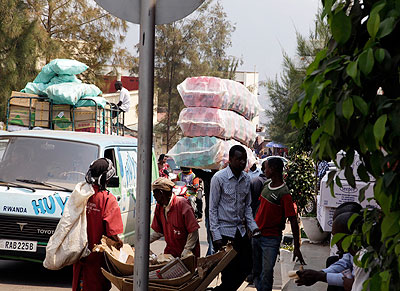Rwanda is not ready for a policy that will allow goods to freely circulate within the East African Community (single customs territory) until a legal framework is established, a top official at the Private Sector Federation (PSF) has said.


Rwanda is not ready for a policy that will allow goods to freely circulate within the East African Community (single customs territory) until a legal framework is established, a top official at the Private Sector Federation (PSF) has said.Hannington Namara, the Chief Executive Officer (CEO) of PSF told Business Times in an interview last week that the country’s readiness for the single customs territory hinges on the setting up of a common legal framework within EAC on taxes, collection of revenues as well as clearing agents."To say that we are ready would be an overstatement, the procedure has to look into the checks and balances to ensure free movement of goods,” he said. According to experts, once implemented, the policy will spark competition, better quality products and high volumes of intra-trade.Some of the requirements for a single customs territory include a common legal framework, circulation of goods with minimal or no border controls, harmonisation of standards for goods moved through the territory, interconnected payment system and collection of customs duties at the first point of entry.Namara said the convertibility of money will only be possible after the monetary union, adding that EAC would not be ready before certain procedures are put into practice.He questioned how countries ensure that goods on transit continue to be on transit and if they are not dumped.It is not yet clear if Rwandan clearing agents will move to the entry points of Dar-es-Salaam and Mombasa and become incorporated their companies and operate as locals.Rwandans are hoping to benefit more when current channels of delivering goods from the ports are enhanced. However, there are risks that the policy would result in losses to the government through levies from imported goods. Internal borders are expected to be removed and goods will move freely into the country as no taxes would be levied on them.Fred Seka, a Kigali-based clearing agent, said he still experiences challenges and suggests that some issues ought to be solved before the establishment of a single customs territory.According to Seka, they have been in talks with their Tanzanian counterparts for joint ventures to register companies but decried that they are forced to cede 61 per cent of the shares to Tanzanians."We suggest that we open up branches at the entry points of Dar es Salaam and Mombasa with the Kigali office as the headquarters,” Seka said on telephone.He noted that, on average, about 122 companies are registered as clearing and forwarding companies employing about 1,000 employees, noting that half of them may end up losing their jobs upon relocation of the offices. "The policy is favouring big and international companies. If we close our business in Kigali yet we got loans to service, it poses huge risks,” he stressed.Experts say the single customs plan would be implemented in less than three years noting that governments are willing to sort things out but one step at a time."There has been hype on NTBs, now that weigh bridges, roadblocks and check points have been reduced, we hope to see a positive change on trade facilitation within the region,” he said.The Minister of Trade and Industry, Francois Kanimba, said the study will be complete by November this year."It’s not a matter of being ready because the study to implement the policy is being conducted and I can not comment before they present the findings,” said Kanimba.Recently, EAC leaders agreed that revenues collected at the point of entry would then be remitted to the destination partner states subject to the fulfilment of key pre-conditions to be developed by the high level task force.A high level taskforce committee has been established to do the roadmap of integration for single customs territory and identify what needs to be done and when.Ministers responsible for trade, finance, investment and development were directed to initiate the operationalisation of the model. They are required to report to the next summit (of EAC Heads of State) to be held in November 2012.




